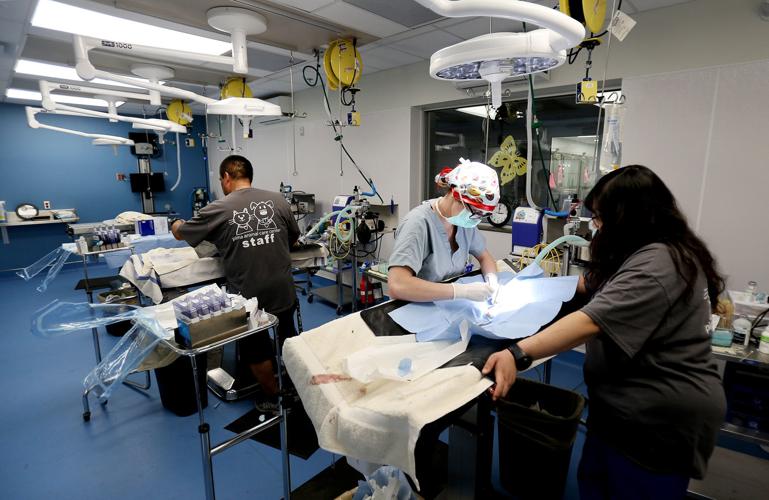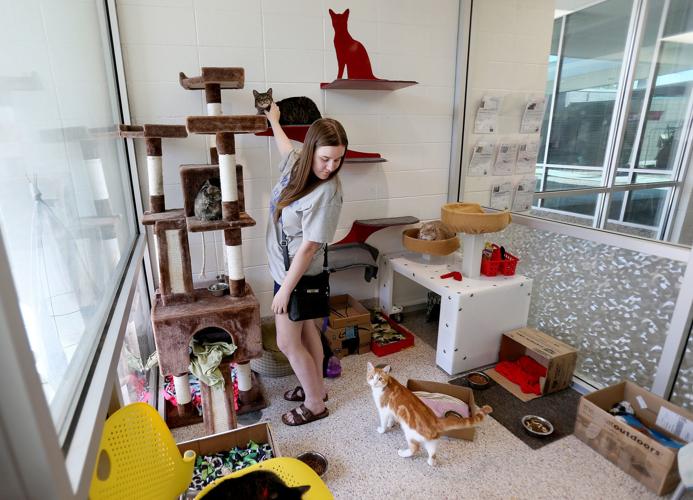Nearly a year after Marana and Sahuarita parted ways with the Pima Animal Care Center, the Tucson City Council has approved a nearly $300,000 increase in funding to the county for animal services.
For the upcoming fiscal year, the city will reimburse the county $4.8 million, a 7 percent change to the previous intergovernmental agreement with the county.
Last July, the towns of Marana and Sahuarita severed ties with the center, saying its services were too expensive. While the cost of the lost contracts — valued at roughly $329,000 — closely mirrors the increased contribution from the city, there is no correlation, said Pima County’s Health Department director, Francisco Garcia.
When Marana and Sahuarita parted ways with PACC, County Administrator Chuck Huckelberry promised the remaining partner jurisdictions — Tucson, Oro Valley and South Tucson — that the county would offset any costs associated with the loss, Garcia said.

Volunteer Laura O’Brien, left, and Pima County JTED intern Georgia Rizer team up to feed a week-old kitten in the new animal-care clinic.
The amount each partner jurisdiction pays each year is dependent on the number of animals taken in from each area, of which Tucson represents the majority, Garcia said.
Projected costs for Oro Valley will actually decrease going into the next fiscal year, while South Tucson will increase slightly, according to Garcia.
“The increased cost is really a worst-case scenario. It represents a ceiling, rather than a floor,” Garcia said, adding that it’s possible the city would reimburse less than the agreed-upon $4.8 million.
The care center meets with representatives from its partner jurisdictions quarterly to look at finances and make sure each municipality is getting what it’s paying for, Garcia said.
The shelter has seen an increase in operating costs over the last several years, rising from $3.39 million in the 2012-2013 fiscal year to $4.69 million in 2016-2017. Operating costs dropped slightly this fiscal year, with the projected costs having been set at $4.54 million, according to data provided by the city.
Of the $4.8 million approved for next fiscal year, $2.5 million is estimated to be spent on shelter and vet services, with $1.36 million allocated to field services and enforcement. The rest of the funding will pay for administration fees, licensing and spay/neuter services.
NEW APPROACH TO CARE
Under new leadership since last July, the PACC is changing its approach to animal care.
Director of Animal Services Kristen Auerbach is working to build a community-engagement program focusing resources and services on pets and people with the greatest needs, according to a June 5 memo to the mayor and council.
“We’re going out into the community and holding free microchip and vaccine clinics, and animal-control officers are assisting the homeless and giving out free leashes and collars,” PACC’s director of internal operations, Michele Figueroa, told the Star. “One of our many goals is to build that relationship with the community, as far as assisting in every way that we can in order to keep animals in their homes and also providing information and education about owning pets.”
Auerbach’s plan includes partnering with human-service agencies to best utilize and expand resources. PACC’s volunteer, foster and rescue partner programs are expanding, and donation efforts are increasing, which will mitigate increases in ongoing expenditures, the memo said.
In December, PACC moved into its new state-of-the-art facility after completion of the first phase of its $22 million expansion and improvement project, which was approved by voters in 2014.
The new facility boasts a cutting-edge veterinary suite, all-cat indoor housing, indoor and outdoor dog housing, and medical isolation and quarantine areas. The shelter also has an adoption and community-services lobby, spaces for animal protection, licensing and dispatch, and a multipurpose room for orientations and classes.
The second phase, which involves remodeling and partially demolishing the original 1960s shelter, is expected to be complete by the end of the summer, with the overflow tent scheduled to come down in a few weeks, Figueroa told the Star.
“This is a bittersweet moment, since the tent has saved more than 20,000 animals in its existence,” she said.
COST SAVINGS
Since cutting ties with PACC, both Marana and Sahuarita appear to be on track to save money.
Marana cut ties with the center in response to increasing costs and a lack of responsiveness, town officials told the Star last year.
Marana officials estimated they were paying $230,000 per year under their previous agreement. By handling its own services, the town spent $169,427 on animal services from July 1 to April 30, according to data provided by the town. That figure doesn’t include a one-time vehicle purchase of $87,000 or $7,200 for “small tools and equipment.” There were several other one-time costs, adding up to an additional $30,000 in expenses.
Under the new plan, the Humane Society of Southern Arizona handles Marana’s shelter services, while the town handles animal control and enforcement. Total costs to the Humane Society for the first 10 months were $20,869.
The major expense came in the way of salaries, at $103,000 for the town’s two animal-control officers through April 30.
The town has issued 614 licenses, generating $82,500 in revenue. Marana Animal Services also brought in an additional $2,500 in donations.
For Sahuarita, maintaining its contract with PACC was estimated to cost $99,000, so instead, town officials opted to sign a contract with the Humane Society that wouldn’t exceed $35,000 per year. The town also contracted for vet services with the Duval Animal Hospital at a capped cost of $10,000 per year.
Animal-licensing services were rolled into the Parks and Recreation department, with enforcement housed in the Sahuarita Police Department. The department created a position for a full-time animal-control and community-service officer, with existing parks and recreation staff taking on licensing duties.
Between July 1, 2017, and Feb. 29, 2018, the town spent roughly $4,250 on Humane Society services and $3,985 for emergency vet services. Animal-control expenses through Sahuarita PD have cost $57,585, but the town has taken in $18,342, according to town data.
The town also recorded a one-time startup cost of $10,633 in June.







